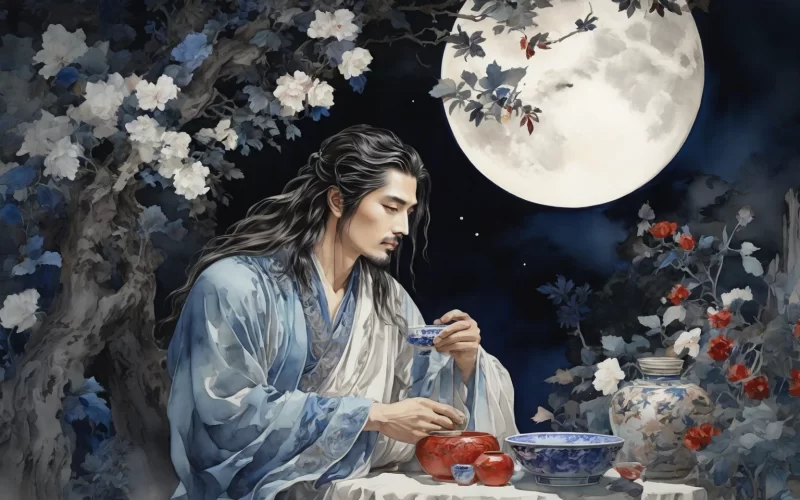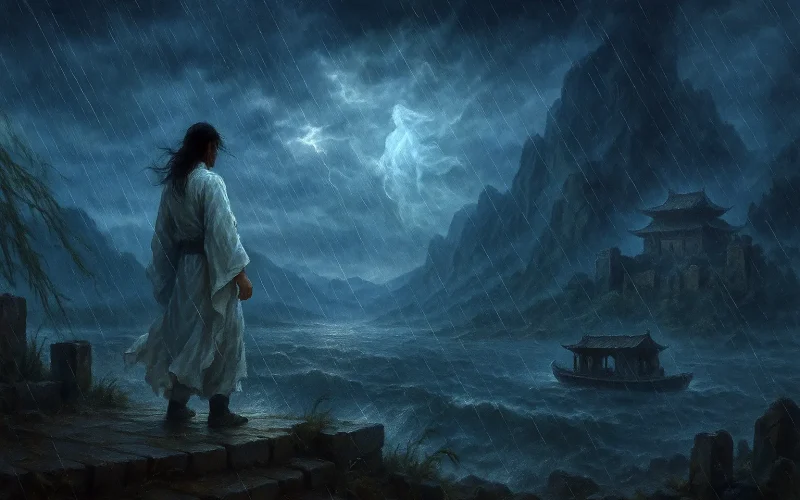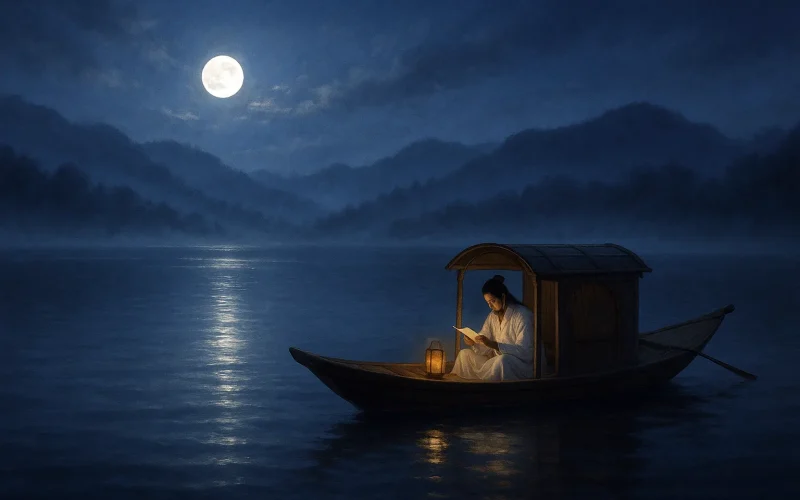If Heaven did not love wine,
There would be no Wine Star in the sky.
If Earth did not love wine,
There would be no wine fountain nearby.
Since Heaven and Earth love wine,
I can love wine, not ashamed on high.
They say the liquor clear is divine;
They say the liquor rare is as fine.
Since both the holy and the sage drink,
Why need we seek gods, do you think?
Three cups help us grasp the great Way;
A gallon makes us with Nature stay.
But if you've got the flavor of wine,
Don't tell it to those who are sober and fine!
Original Poem
「月下独酌 · 其二」
李白
天若不爱酒,酒星不在天。
地若不爱酒,地应无酒泉。
天地既爱酒,爱酒不愧天。
已闻清比圣,复道浊如贤。
贤圣既已饮,何必求神仙。
三杯通大道,一斗合自然。
但得酒中趣,勿为醒者传。
Interpretation
This poem was composed during the latter part of Li Bai's service as a court academician or after his dismissal from office—the second work in a series. Having experienced firsthand the hypocrisy and constraints of palace life, the poet faced profound disillusionment regarding his political ambitions. Within this context, wine became his means of confronting reality and pursuing spiritual transcendence. Employing a seemingly logical structure that masks deeper intent, the poem pulses with emotional intensity, elevating wine to supreme value as both a subversion of worldly conventions and a solemn justification for his chosen way of life.
First Couplet: "天若不爱酒,酒星不在天。"
Tiān ruò bù ài jiǔ, jiǔxīng bù zài tiān.
If heaven loved not wine, No Wine Star would shine in the sky.
The poet launches his grand argument with cosmic evidence, citing the celestial "Wine Star" as irrefutable proof of divine favor for wine. This characteristically Li Bai-esque reasoning—both naive and persuasive—instantly elevates personal inclination to cosmic harmony.
Second Couplet: "地若不爱酒,地应无酒泉。"
Dì ruò bù ài jiǔ, dì yīng wú Jiǔquán.
If earth loved not wine, No Wine Spring would flow on the land.
Shifting from heaven to earth, the poet cites the toponym "Wine Spring" as terrestrial testimony. Paired with the celestial "Wine Star," this forms an unassailable universal axiom: love of wine is inherent in nature itself.
Third Couplet: "天地既爱酒,爱酒不愧天。"
Tiāndì jì ài jiǔ, ài jiǔ bùkuì tiān.
Since heaven and earth love wine, I love wine without shame.
Here lies the syllogistic core: from the premise that cosmos loves wine, the conclusion follows that the poet's love of wine mirrors cosmic will. This is both a witty rebuttal to criticism and a declaration that his conduct aligns with natural law, not human convention.
Fourth Couplet: "已闻清比圣,复道浊如贤。"
Yǐ wén qīng bǐ shèng, fù dào zhuó rú xián.
I've heard clear wine called "Sage," And turbid wine hailed as "Worthy."
The poet turns from cosmos to culture, alluding to historical records where clear and turbid wines were metaphorically honored as sage and worthy. This elevates wine's status to moral nobility, paving the way for further argument.
Fifth Couplet: "贤圣既已饮,何必求神仙。"
Xián shèng jì yǐ yǐn, hébì qiú shénxiān.
Since Sages and Worthies drank, Why seek elusive immortals?
This marks the first philosophical leap: the poet transcends his earlier pursuit of immortality, finding in wine a tangible sagehood that replaces transcendent fantasy. Spiritual fulfillment shifts from external quest to embodied experience.
Sixth Couplet: "三杯通大道,一斗合自然。"
Sān bēi tōng dàdào, yī dǒu hé zìrán.
Three cups connect to the Great Way; A gallon merges me with nature.
This couplet articulates the core of Li Bai's oenological philosophy. Wine becomes a key to unlocking Daoist cosmic principles—"Great Way" and "nature"—envisioning an ecstatic unity of individual spirit and universal truth.
Seventh Couplet: "但得酒中趣,勿为醒者传。"
Dàn dé jiǔ zhōng qù, wù wèi xǐng zhě chuán.
But grasp wine's inner delight— Never explained to the sober.
The closing lines resonate with proud resignation. "Wine's inner delight" signifies ineffable ecstasy, while "the sober" represent convention-bound souls. "Never explained" draws a boundary of spiritual autonomy, conveying both defiance and sublime isolation.
Holistic Appreciation
This work stands as a romantic "Dionysian hymn" and poetic declaration of independence. While following a rigorous thesis-argument-climax structure, it overflows with whimsical imagination and persuasive power. Through a progressive sanctification of wine—first cosmically, then culturally, and finally philosophically—the poet elevates his own conduct to sacred status. Superficially defending the act of drinking, the poem actually surges with indignation over unrecognized talent, disdain for worldly mediocrity, and passionate pursuit of spiritual freedom. This masterful blending of solemnity and wit, of intoxication and lucidity, creates profound vitality beneath a seemingly playful surface.
Artistic Merits
- Argumentative Poetry, Logic-Emotion Fusion: The poem constructs a self-consistent "oenophilic logic" from cosmos to sages to cosmic principles, yet this framework serves overwhelming emotion, achieving a unique aesthetic of "rational ecstasy."
- Artful Allusion, Refining the Mundane: References like "Wine Star," "Wine Spring," and "sage-worthy wine" are deployed effortlessly, grounding the argument in cultural depth and elevating daily drinking into philosophical ritual.
- Layered Transcendence: The imagery ascends from "physical wine" (celestial-terrestrial proofs) to "cultural wine" (sage-worthies), then to "philosophical wine" (Great Way/nature), culminating in "experiential wine" (inner delight)—each layer expanding the conceptual horizon.
- Strategic Contrast: The juxtaposition of "wine's delight" with "the sober" sharpens the divide between spiritual autonomy and conventional existence, intensifying the poem's critical edge.
Insights
The poem demonstrates the power to construct meaning and defend spiritual autonomy amid adversity. Li Bai teaches that when the outer world frustrates our ideals, we can still build an inner universe of value. His "wine" symbolizes any passion that transports us beyond limitations toward freedom. It reveals that life's worth lies not only in fulfilling societal expectations but in finding a unique path that resonates with one's soul—and having the courage to safeguard that profound "inner delight," untranslatable to the conventional world.
About the poet

Li Bai (李白), 701 - 762 A.D., whose ancestral home was in Gansu, was preceded by Li Guang, a general of the Han Dynasty. Tang poetry is one of the brightest constellations in the history of Chinese literature, and one of the brightest stars is Li Bai.












